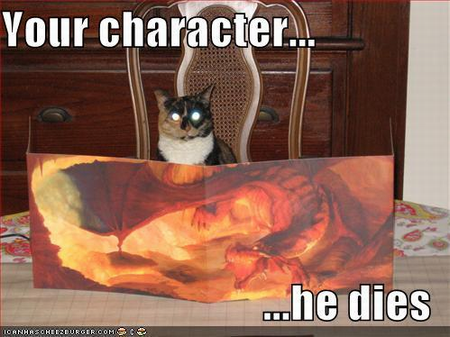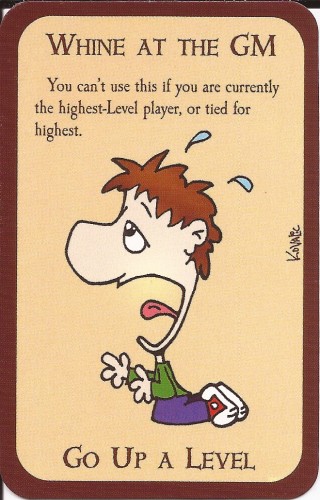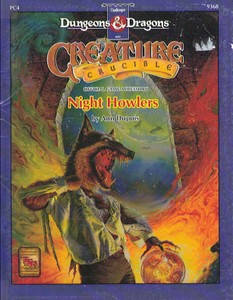The tabletop gaming community is slowly becoming a smaller slice of the “gamer pie”. Too often, the lost art of paper, pencils, dice – not to mention face-to-face conversation – is being replaced by MMOs, Steam, and other technological wonders. But it’s not outdated. Not yet. If the resurgence in the non-video game world continues, there’s hope for us yet. Even some of you uninitiated gamers may wonder to yourself, “Gee, I wonder what tabletops are like?” Well, before you dive in headfirst into the land of excessively large dice collections, it would be wise to familiarize yourself with some of the known stereotypes of tabletop gamers you’ll run into in your travels.
The Munchkin
(aka The Power Gamer, The Metagamer)
This is probably one of the more notable stereotypes for gamers, both because of its prevalence in the gaming community and for the popular Steve Jackson game that bears its name. Munchkins know how to optimize (a.k.a. “min/max”) their potential characters. This is the type of player who made a level 3 Warrior in D&D 3.5, yet somehow managed to get an attack bonus of +21 with a threat range of 15-20. Even if you aren’t fully aware what that means, any experiencing with leveling characters should tell you that’s a bit messed up.
Ever play World of Warcraft and get into that conversation on Vent about how their DPS is all 4 points below the max? Yeah, that’s a Munchkin. At least with WoW, there’s a multitude of online tools to help you automatically generate those numbers. Tabletop, however, takes a certain amount of patience and panache.
Be wary: sometimes their visions of blindingly high output tends to lead to some rules being “overlooked” or “forgotten”.
Disadvantages for a GM:
- Munchkins will rip apart nearly anything at their level in a single action.
- Other PCs feel invincible when the Munchkin is around.
- Newer PCs could also feel marginalized by feeling less useful.
Advantages for a GM:
- You can up the difficulty of your NPCs.
- When a few battles transpire wherein everyone in the group is torn apart except for the Munchkin, the group will turn on him. Sometimes, mutiny is the best way to go.
The Rules Lawyer
(aka The Know-It-All)
What can be said for The Rules Lawyer that isn’t already obvious? This type of gamer could have written their senior Psychology thesis about the transition from D&D 3.5 to D&D 4.0 and the negative effect it had on the gaming community as a whole. You’d think they worked for gaming company, and probably could if they had the drive and determination to apply. Instead, they share this excessive knowledge with you whether you want them to or not.
These players have followed the entire gaming system from 1st edition to now, and can write lengthy dissertations about the significant changes. It’s certainly handy to have someone at the table who knows all the rules to a system, but it can be frustrating when things don’t go their way.
Disadvantages for a GM:
- When you say someone can’t do something, The Rules Lawyer knows that they can, and will cite page references to back it up.
Advantages for a GM:
- When you say someone can’t do something, The Rules Lawyer knows that they can’t, and will cite page references to back it up.
The Collector
(aka The Hoarder, The Librarian)
The collector is a special breed of tabletop gamer: one with an abundance of monetary resources. Any gamer who delves into the internet pirate realm will tell you that finding PDF collections of game systems is tricky at best. Some fall out of date and are never updated, while others are incredibly hard to find. Gaming companies have taken strides to deter piracy of their digital releases, and some just plain refuse to release PDF versions. This is unfortunate for gamers in general as they are often much more affordable than printed material.
Intrepid Collectors, however, manage to amass their collections by purchasing EVERY supplement known to man. Do you know how many books were printed for D&D 3.0 and 3.5? 65. And that’s not even counting Forgotten Realms or Eberron (another 15-20 books each).
Sure, it’s easy enough to find PDF collections of those systems now, but The Collector has all the books. They could fill a bookcase with every volume they have on the system. To a lesser extent of the Rules Lawyer, they also can find obscure gear that you never even dreamed of. That climbing kit that gives a +10 bonus to climbing flat, slippery, vertical surfaces? Yeah, they made that. The Collector will show you where.
Disadvantages for a GM:
- They will legitimately bring any and all legal resources into a game.
- They live a cardinal tabletop rule: if it’s printed, they can have it in game.
Advantages for a GM:
- At the very least, you know someone you can borrow any of the books off of.
The Casual Player
(aka The Part-Timer, The Half-Hearted)

“Hey guys, look at this!”
Photo by Eric Arnett
The Casual Player tends to be the one that loves the idea in concept, but getting them to invest any more than minimal effort is a chore. They make characters with whatever resources are directly in front of them at the time with as little thought into rhyme or reason as possible.
It’s not that they are bad players, but they don’t put much effort into their character/story/group outside of game sessions. They never think about character development until you actually play and force them to talk about it, only to forget all of that wonderful back story the second the session ends. The Casual Player wants to participate, but they will need to be prodded repeatedly to stay engaged over long campaigns or you risk losing their involvement. They do it just to be social, or maybe they just don’t want to be seen with you in public. Either way, they are out there.
Disadvantages for a GM:
- The Casual Player is generally the one person to lag behind in every game you run, and spends most of the session on their iPhone looking at pictures of funny cats.
Advantages for a GM:
- They are probably the least amount of trouble. They often bring useful excitement to groups for new campaigns, even if it isn’t long-lasting.
The Jock
(aka The Meathead, The Baller)
The Jock isn’t necessarily the dumb player, nor does it refer to a sports background. The Jock, as it pertains to tabletop, is the person you’d least expect to be sitting at a table-top RPG with you. Their interest in the game is genuine, but it feels almost out of left left field where these people come from. Most people that play RPGs are students, IT professionals, office workers, writers, those of other mundane, less physically demanding jobs. The Jock, however, comes from a different background than your standard gamer.
Vin Diesel? Yep, he’s a Jock.
Ever play a tabletop with a martial artist? Yeah, they’re a Jock too.
The average gamer is not in tip-top shape, spending a few times a week at a gym, or jogging, or some other physical exercise that keeps them away from all the junk food snacks people bring to game sessions. The Jock is just someone you wouldn’t normally predict would want to spend their Friday evening pretending to be an angry dwarf, and that’s just fine with me.
Disadvantages for a GM:
- If you’re not one of them, you’re horribly afraid to do something terrible to them in-game, whether that fear is justified or not.
Advantages for a GM:
- True to form, they still stick up for their gamer friends to groups not familiar with the wonderful activity that is tabletop gaming.
The Asshole
(aka, The Instigator, The Dissenter)
There’s a saying in the game world that goes something like this: “The best laid plans of GMs often go awry.” This holds true in so many ways. In my circle, we’ve referred to destroying a GM’s intricate handiwork as “pulling a Bob”, an homage to our wonderful friend who, during one game session of D&D, made a gnome that somehow ruined every GM plan with shenanigans and lucky rolls.
For every “Bob” you can have in a group, there’s always The Asshole. Simply put: the Asshole is the player that loves causing trouble. They’ll make a character that backstabs the party in-game and won’t tell anyone about it. You’d almost want to them to be the GM, except for the fact that they won’t hesitate to wipe out the group within three sessions. They live, breathe, and die by chaos. This isn’t the healthy “Bob” chaos that makes GMs pull out their hair and cause memorable stories. No, this is the chaos that drives your players mad. They can be very toxic to a gaming group; unless you’re playing a game of Call of Cthulu or Paranoia, be wary.
Disadvantages for a GM:
- They ruin everything you try to do, and not even in a fun way.
- Their antics can affect overall group enjoyment.
Advantages for a GM:
- Player characters turning on other player characters is always the most satisfying in these circumstances.
The Gnome
(aka The Monkey Wrench, The “Bob”)
The Gnome is exactly what you think of when you hear the word. Ever play a D&D or Pathfinder game, and when someone says that they want to make a gnome, someone always utters the phrase “Oh no…”? There’s a reason for that. Any game system lore about gnomes goes into detail about their tenacity, their chaotic nature, their creative means, but most of all, their unpredictability. I’ve seen GMs spend weeks, sometimes months, setting up
intricate floor plans, dungeon designs, and special multi-classed, over-powered (dare I say “Munchkined”) antagonists who are designed solely to make that particular game session epic. And it all goes down the drain, with one horribly wacky use of a turn action.
The worst part is, sometimes it’s your fault. Here’s a good “Bob” example: One session, during downtime, Bob asked the GM if his gnome could invent “glue bombs”, similar to an Alchemist’s Tanglefoot Bomb, but on a much smaller scale. Harmless enough, right? Yep, totally harmless – unless he uses True Strike to toss one right into a boss-leveled sorcerer’s mouth. Yeah, I didn’t see it coming, either.
Disadvantages for a GM:
- Thinks so far outside of the box, you’d think he was playing with you guys via Skype from Abu Dhabi.
Advantages for a GM:
- They certainly keep things interesting, if nothing else.
- They will provide you exercises in your own creative storytelling abilities.
Stay tuned for Part 2 of Tabletop Stereotypes, coming soon!
![]()
Joe Bouchard is an avid gamer and is a regular contributor to the site. A 15 tabletop veteran, he spends his Friday nights at the local college rolling dice with people mostly even older than him. His current tabletop is Shadowrun 4th edition. He can be reached at joe@cardboardrepublic.com.
Are there any groups you feel are missing? You can discuss this article and more on our forums!



